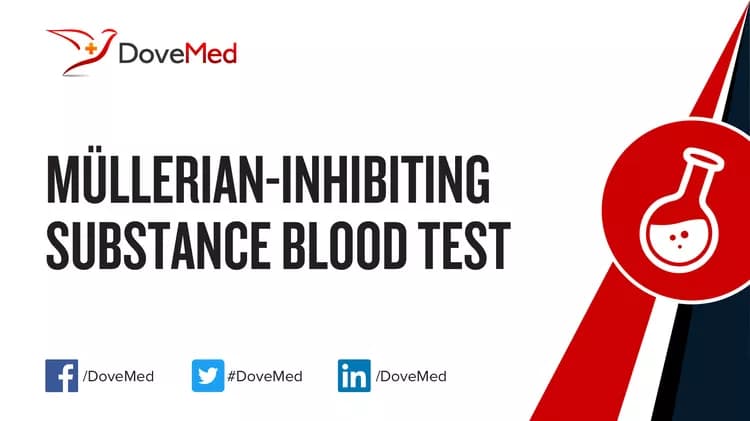What are other Names for this Test? (Equivalent Terms)
- Anti-Müllerian Hormone Blood Test
- APH Blood Test
- Müllerian-Inhibiting Factor Blood Test
What is Müllerian-Inhibiting Substance Blood Test? (Background Information)
- Müllerian-inhibiting substance (MIS) is a hormone important for sexual development. MIS is made predominantly by the testes in male fetuses during the first 8 weeks of growth in the uterus
- MIS blocks the formation of the Müllerian ducts, which would otherwise eventually turn into the uterus, cervix, and part of the vagina. In female fetuses, MIS causes the normal development of these structures
- An inadequate MIS level in male fetuses causes abnormal sexual development, including the formation of female sexual organs. It often leads to cryptorchidism, or undescended testicles. Likewise, an excessive level of MIS in developing female fetuses stunts the growth of female sexual organs
- The Müllerian-Inhibiting Substance Blood Test helps determine the levels of MIS in blood. It is used to diagnose sexual development disorders
What are the Clinical Indications for performing the Müllerian-Inhibiting Substance Blood Test?
Following are the clinical indicators for performing the Müllerian-Inhibiting Substance Blood Test:
- Investigating a possible recurrence of granulosa cell tumors
- Undescended testes (cryptorchidism)
- Abnormal or absence of testes
How is the Specimen Collected for Müllerian-Inhibiting Substance Blood Test?
Following is the specimen collection process for Müllerian-Inhibiting Substance Blood Test:
Sample required: Blood
Process of obtaining a blood sample in adults:
- A band is wrapped around the arm, 3-4 inches above the collection site (superficial vein that lies within the elbow pit)
- The site is cleaned with 70% alcohol in an outward spiral, away from the zone of needle insertion
- The needle cap is removed and is held in line with the vein, pulling the skin tight
- With a small and quick thrust, the vein is penetrated using the needle
- The required amount of blood sample is collected by pulling the plunger of the syringe out slowly
- The wrap band is removed, gauze is placed on the collection site, and the needle is removed
- The blood is immediately transferred into the blood container, which has the appropriate preservative/clot activator/anti-coagulant
- The syringe and the needle are disposed into the appropriate “sharp container” for safe and hygienic disposal
Preparation required: No special preparation is needed prior to the test.
What is the Significance of the Müllerian-Inhibiting Substance Blood Test Result?
The normal values for the Müllerian-Inhibiting Substance Blood Test depend the age of the individual, and are as follows:
- 0-13 days: 15.5-48.7 ng/mL
- 14 days-11 months; 39.1-91.0 ng/mL
- 12 months-6 years: 48.0-83.2 ng/mL
- 7-8 years: 33.8-60.2 ng/mL
- 9 years to adult: 3.0-5.4 ng/mL
The significance of the MIS Blood Test is explained:
- A high value for the test may point to a diagnosis of polycystic ovarian syndrome (PCOS)
- A low value for the test may point to a diagnosis of:
- Anorchia
- Abnormal or absence of testes
- Pseudohermaphroditism
- Syndrome of persistent Müllerian ducts, despite the presence of structurally normal testes
The laboratory test results are NOT to be interpreted as results of a "stand-alone" test. The test results have to be interpreted after correlating with suitable clinical findings and additional supplemental tests/information. Your healthcare providers will explain the meaning of your tests results, based on the overall clinical scenario.
Additional and Relevant Useful Information:
- The Müllerian-Inhibiting Substance Blood Test is not a well-standardized test. The results for the test must be taken into consideration along with the symptoms exhibited
- MIS is also made in women by the ovaries during reproductive years. According to a scientific study, the levels in African American women are 25.2% lower than those in Caucasian women, and levels in Hispanic women are 24.6% lower than those in Caucasian women.
Certain medications that you may be currently taking may influence the outcome of the test. Hence, it is important to inform your healthcare provider of the complete list of medications (including any herbal supplements) you are currently taking. This will help the healthcare provider interpret your test results more accurately and avoid unnecessary chances of a misdiagnosis.
Please visit our Laboratory Procedures Center for more physician-approved health information:
http://www.dovemed.com/common-procedures/procedures-laboratory/
Related Articles
Test Your Knowledge
Asked by users
Related Centers
Related Specialties
Related Physicians
Related Procedures
Related Resources
Join DoveHubs
and connect with fellow professionals


0 Comments
Please log in to post a comment.